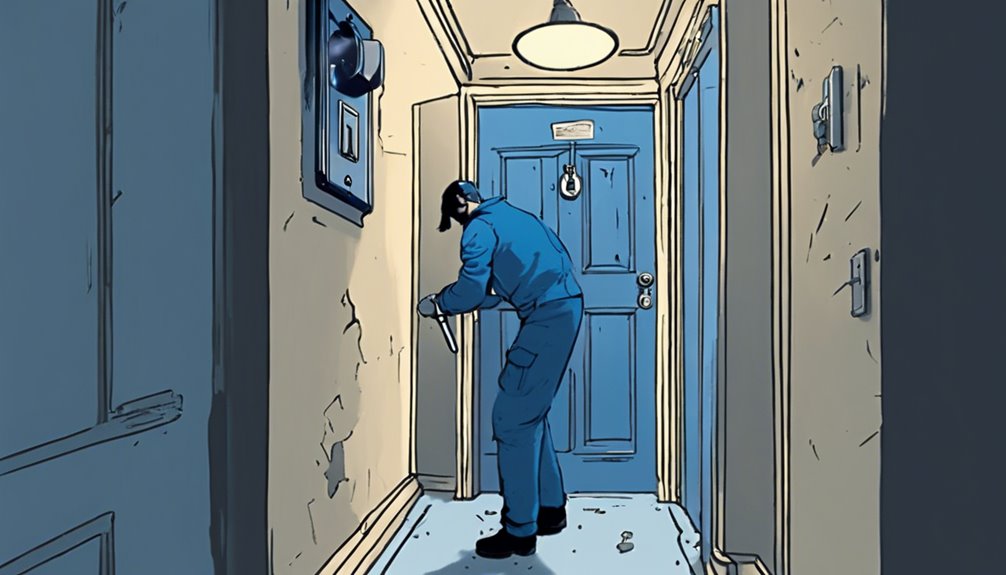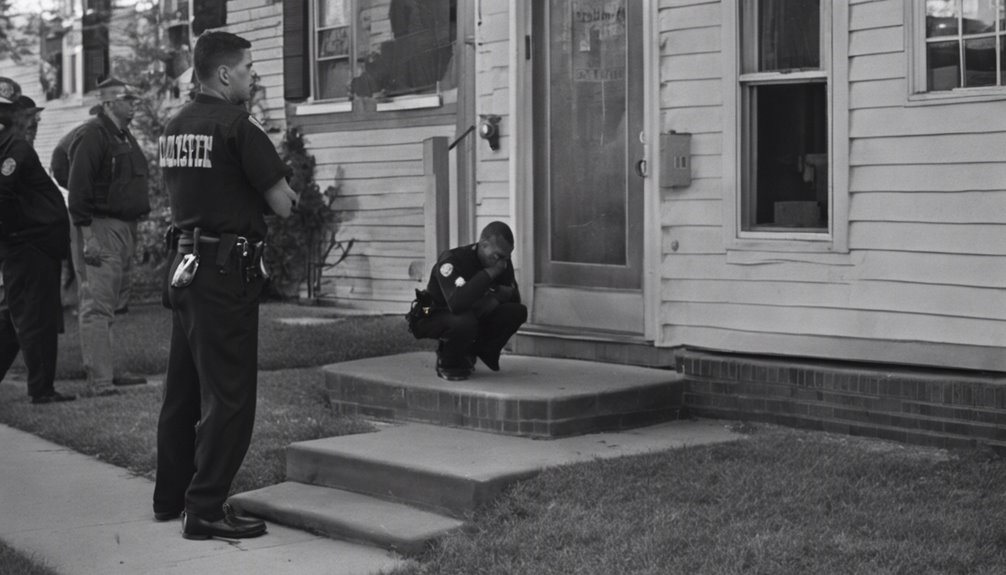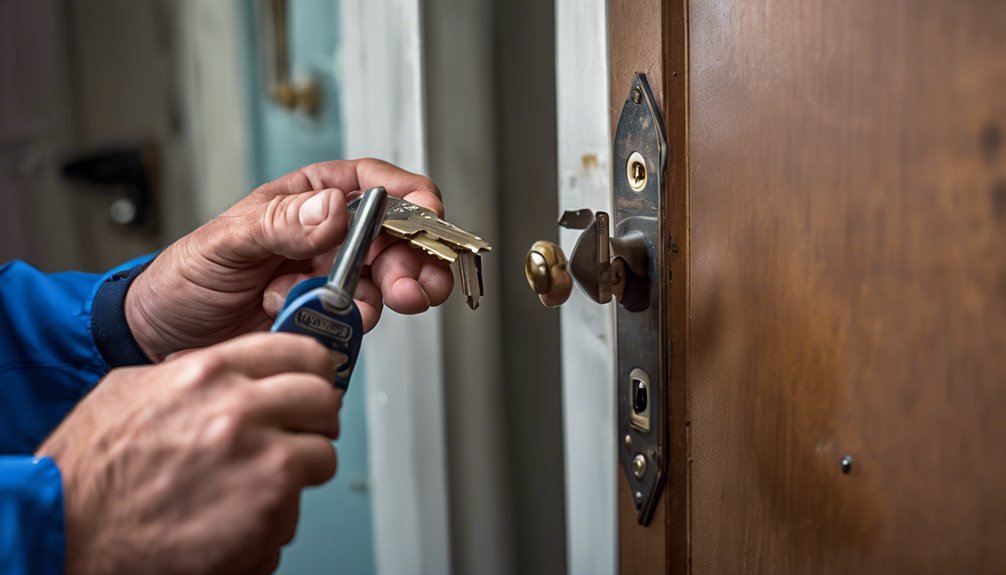You might not realize that locksmiths play an essential role in managing the complexities of eviction procedures in Illinois. They're not just there for emergency lockouts; their expertise helps guarantee that the eviction process adheres to legal standards and protects property rights. By understanding their responsibilities, you can see how they impact both landlords and tenants. Curious about the specific services locksmiths provide and how these contribute to a smooth eviction process?
Key Takeaways
- Locksmiths change or rekey locks to prevent former tenants from re-entering properties after an eviction, ensuring security compliance.
- They verify the legality of eviction proceedings through court orders, aligning services with Illinois Landlord and Tenant Act requirements.
- Locksmiths collaborate with law enforcement during evictions to ensure professional handling and minimize conflicts with former tenants.
- They conduct security assessments post-eviction, recommending additional measures to address vulnerabilities and prevent unauthorized access.
- Quality locksmith services are verified through licensing, reputation, and experience with eviction cases to ensure effective and legal compliance.
Importance of Locksmiths in Evictions

When evictions occur, engaging a locksmith is essential not just for security, but for ensuring a smooth and respectful shift. Effective locksmith services play a pivotal role in securing the property by changing or rekeying locks, thereby preventing evicted tenants from re-entering. You'll want to confirm that all access points are addressed, including securing mailboxes, garages, and any other locked areas.
Moreover, locksmiths facilitate a seamless change by working alongside law enforcement and property owners. They can open doors if tenants have changed locks or lost keys, and provide emergency access when necessary. This coordination is critical in handling sensitive situations with professionalism and respect. Additionally, locksmiths must ensure compliance with legal boundaries established by court orders to protect both landlords and tenants. They must also be familiar with the specific eviction laws that govern the process to ensure their actions align with legal standards. The Illinois law stipulates that landlords must act within their rights when changing locks to maintain legal integrity.
Locksmiths also prevent unauthorized access post-eviction. They change locks and security settings to mitigate the risk of retaliation break-ins. Additional security measures, such as intercom systems or updated locks, may be recommended to bolster overall property security.
Beyond basic locking mechanisms, locksmiths offer additional services tailored to current needs. They can assist tenants with emergency reentry if sanctioned by the court and provide ongoing security solutions to prevent future unauthorized access.
This all-encompassing approach protects property interests while promoting the desire for freedom and safety among all parties involved. Engaging a locksmith during evictions isn't merely a precaution—it's a necessity that safeguards peace of mind for landlords and tenants alike.
Legal Obligations for Locksmiths

Although locksmiths play an essential role in the eviction process, they must adhere to specific legal obligations to confirm compliance and protect all parties involved. These obligations guarantee that evictions are executed lawfully and efficiently, minimizing potential legal conflicts. Additionally, to maintain industry standards, locksmiths must be aware of the importance of ensuring trust through compliance with regulatory measures.
Locksmiths are required to verify that the eviction is lawful. This includes checking court orders and confirming compliance with both local and state laws, particularly the Illinois Landlord and Tenant Act. They must verify correct lock changes or rekeying occurs post-eviction, particularly in larger counties. In addition, locksmiths need to coordinate effectively with law enforcement to facilitate smooth property access. Compliance with the legal requirement to change or rekey locks for new tenants is vital to maintaining security and avoiding liability issues. It is important to note that landlords must follow specific rekeying laws to ensure they are not infringing on tenant rights.
Here's a summary of the essential legal obligations locksmiths must fulfill:
| Legal Obligation | Description | Importance |
|---|---|---|
| Verify Eviction Legality | Confirm court order and legal compliance | Prevents unauthorized actions |
| Comply with State Laws | Adhere to the Illinois Landlord and Tenant Act | Ensures lawful procedures are followed |
| Change or Rekey Locks | Update security before new tenants occupy | Protects property and complies with legal standards |
| Coordinate with Law Enforcement | Work alongside police during the eviction process | Minimizes conflicts and ensures safety |
| Avoid Legal Troubles | Guarantee all actions align with court orders | Protects landlords from potential legal issues |
In adhering to these obligations, locksmiths not only facilitate eviction processes but also safeguard the rights and freedoms of landlords and tenants alike.
Primary Services Offered

Locksmiths in Illinois offer a range of primary services essential to guaranteeing the security and integrity of properties during and after the eviction process. One of the most significant tasks is changing or rekeying locks to prevent evicted tenants from re-entering. They verify all locking mechanisms are secure and functional, handling everything from traditional locks to advanced keyless smart locks, while minimizing damage during the changeover. Additionally, it is important for locksmiths to operate within the bounds of legality, as unauthorized locksmithing can lead to serious consequences. Furthermore, locksmiths are required to comply with essential lock safety standards to ensure the locks they install meet safety requirements.
In addition to lock management, locksmiths conduct extensive security assessments to identify vulnerabilities and recommend further security measures post-eviction. This includes reprogramming user codes for smart locks and installing new security features, such as mailbox locks, if required. They also provide ongoing security solutions, which help protect properties from unauthorized access or vandalism.
Emergency access services are another important function. If tenants have changed locks or your keys are unavailable, locksmiths grant swift and legal access to the property. They produce duplicate keys for property owners and assist with gaining entry during the eviction, minimizing disruption.
Following the eviction, locksmiths secure the property immediately, reinforcing all access points to prevent tenant re-entry. They repair any damage incurred during the eviction process and conduct home security assessments to prepare the property for new tenants. Given the eviction order issued by the court, securing the property becomes even more critical to prevent unauthorized access by evicted tenants.
With these extensive services, locksmiths play an essential role in facilitating a smoother, more secure eviction experience, ultimately allowing you to reclaim your property with clarity and confidence.
Collaboration With Law Enforcement

In the eviction process, your collaboration with law enforcement is essential for preventing property damage and ensuring an efficient lockout.
By coordinating with law enforcement, you can access the property safely while minimizing the risk of conflict with former tenants. Additionally, it's important to ensure that your services meet ADA compliance, which promotes accessibility for all individuals during the eviction process.
Furthermore, this teamwork streamlines the process, allowing you to address any lock-related issues promptly and effectively. Additionally, understanding your rights and responsibilities under Illinois employment laws is crucial for ensuring compliance and safeguarding your business during such procedures.
Ensuring Property Damage Prevention
Guaranteeing property damage prevention during eviction processes is essential, and collaboration with law enforcement plays a pivotal role in achieving this goal.
When you engage a locksmith, you're not only protecting your investment but also facilitating a smoother eviction experience.
Here are key ways in which this collaboration can minimize damage:
- Expertise Utilization: Locksmiths use specialized tools to remove tenants safely, preventing unnecessary breakage and ensuring compliance with lock picking laws in Illinois.
- Legal Compliance: They guarantee that the eviction process abides by legal requirements, safeguarding against invalid claims.
- Security Restoration: Post-eviction, locksmiths can promptly rekey locks and change mailbox locks to maintain security.
- Understanding Key Duplication Laws: It's important for locksmiths to be aware of key duplication laws in Illinois to ensure they operate within legal boundaries during the eviction process.
Efficient Lockout Process
While managing the eviction process, fostering a collaborative relationship with law enforcement is essential for an efficient lockout. You must verify that the eviction is lawful by confirming the court order provided by law enforcement. This step is significant, as it helps you work within legal boundaries and meet all requirements before proceeding.
Timing plays an important role; consequently, you'll need to coordinate closely with the Sheriff's Office to schedule a specific date and time for the eviction. Presence during the eviction process is necessary, as your assistance can facilitate a smooth shift.
In cases where tenants resist or are absent, you'll collaborate with law enforcement to gain access, minimizing potential damage even when forced entry becomes unavoidable.
Once the eviction is complete, you'll need to secure the property by changing or rekeying locks to deter the evicted tenants from returning. Providing duplicate keys for the landlord or property management is also part of your responsibilities.
Additionally, offering ongoing security solutions can further protect against unauthorized access or vandalism, enhancing the property's safety long after the eviction is finalized.
Post-Eviction Security Measures

After an eviction, it's essential to evaluate lock rekeying options to prevent former tenants from gaining unauthorized access.
By enhancing property security with new locks or advanced locking systems, you can greatly mitigate potential risks.
Implementing these measures not only protects your investment but also promotes peace of mind for current occupants.
Lock Rekeying Options
When managing the aftermath of an eviction, understanding the lock rekeying options available is essential for maintaining security. Rekeying locks helps prevent evicted tenants from re-entering, ensuring that your property remains secure.
Here are a few key benefits of rekeying your locks:
- Cost-Effectiveness: Rekeying is usually less expensive than replacing locks entirely.
- Speed: Locksmiths can rekey locks quickly, minimizing any downtime for your property.
- Compliance: This process aligns with legal standards for securing properties post-eviction.
The rekeying process involves replacing the internal key pins of your current locks to create a new key configuration. This efficient method enhances security by altering the lock's internal mechanisms, allowing you continued use of existing locks with new keys.
Additionally, locksmiths can provide specialized services during this sensitive situation, ensuring all steps meet legal requirements.
Enhancing Property Security
To effectively secure your property after an eviction, implementing robust post-eviction security measures is essential. Start by changing locks to prevent any unauthorized re-entry by evicted tenants. Hire professional locksmiths to handle lock changes, ensuring all previous keys are invalidated. Document new keys and combinations for secure management.
Here's a quick overview of important security measures:
| Security Measure | Description |
|---|---|
| Lock Changes | Replace locks and invalidate old keys. |
| Security Assessment | Identify and address vulnerabilities on the property. |
| Emergency Access | Grant access if keys are missing or locks have been changed. |
Furthermore, conduct a thorough security assessment to identify vulnerabilities such as unsecured windows or weak door frames. It's essential to recommend extra measures like installing deadbolts or security cameras. Additionally, manage and store new keys securely, ensuring all necessary parties have access.
Using ongoing security solutions like alarms or motion detectors can enhance your property's defenses against future breaches. Engaging in these practices not only safeguards your property but also reinforces your rights as a property owner.
Selecting a Qualified Locksmith

Selecting a qualified locksmith is essential for guaranteeing a smooth and lawful eviction process in Illinois. By choosing someone who meets specific qualifications, you can navigate this delicate situation with greater confidence. Keep these key aspects in mind:
- Licensing & Compliance: Confirm your locksmith holds a valid license from the Illinois Department of Financial and Professional Regulation, having completed the required training and criminal background check.
- Experience in Evictions: Opt for a locksmith with experience, particularly in eviction cases, who understands both residential and commercial lock systems.
- Professional Reputation: Investigate the locksmith's reputation in your community. Positive reviews and a solid track record indicate professionalism and reliability.
A qualified locksmith must also verify that the eviction is lawful by checking the appropriate court order. They need to work within legal boundaries, following established procedures, which include providing tenant notification and coordinating with law enforcement when necessary.
In addition, look for locksmiths who can respond swiftly to emergencies and offer a range of services like lock rekeying and installation of high-security systems. This not only enhances security but guarantees you have a trusted partner during the eviction process.
Frequently Asked Questions
What Qualifications Should I Look for in an Eviction Locksmith?
When seeking an eviction locksmith, prioritize these qualifications: guarantee they're licensed by the Illinois Department of Financial and Professional Regulation and that they've passed the necessary exams.
Verify they've hands-on experience with both residential and commercial lock systems, especially smart locks.
It's essential they maintain general liability insurance and have a solid reputation.
Finally, confirm they can respond promptly to urgent situations, demonstrating professionalism even in challenging circumstances.
How Much Do Locksmith Services Cost During Evictions?
When the door of opportunity swings shut, locksmith services can help you regain control, especially during evictions.
Generally, rekeying starts around $19, with gaining access and hardware replacement closer to $30. However, hourly rates can jump to $40-$60.
Lockout services range from $100-$150, and additional fees may crop up for time spent waiting.
Understanding these costs helps you navigate the financial landscape effectively, ensuring you're prepared for any situation that arises.
Can Tenants Request Locksmith Services During an Eviction?
During an eviction, you generally can't request locksmith services to secure your access to the property.
The legal process dictates that landlords must follow specific procedures to regain possession. If you've locked yourself out or need access, contacting your landlord is essential.
Remember, attempting to enter the property without authorization can lead to further complications.
Always consider your rights, and if necessary, seek legal advice to understand your options during such situations.
What Happens if a Locksmith Refuses to Proceed With an Eviction?
When a locksmith refuses to proceed with an eviction, it's like a door jammed shut, leaving both landlords and tenants in a state of uncertainty.
You'll face delays, as the locksmith's hesitation signals potential legal issues. This stall can expose the property to security risks or prolong the eviction process.
Your best course is to seek another licensed locksmith capable of ensuring compliance with court orders, safeguarding your obligations while respecting tenant rights.
Do Locksmiths Provide Services for Commercial Evictions as Well?
Yes, locksmiths do provide services for commercial evictions. They possess the expertise to manage complex lock systems, such as master key and electronic locks.
Their role extends to ensuring security post-eviction, rekeying locks, and collaborating with authorities to facilitate the process.
Conclusion
In the domain of Illinois eviction procedures, locksmiths serve as guardians of safety and compliance. Imagine a smooth changeover as they deftly turn the key, sealing former tenants out while reinforcing security for landlords. Their expertise guarantees all measures taken align with legal standards, paving the way for a secure future. By choosing a qualified locksmith, you not only safeguard your property but also uphold the integrity of the eviction process, invoking peace of mind in uncertain times.









